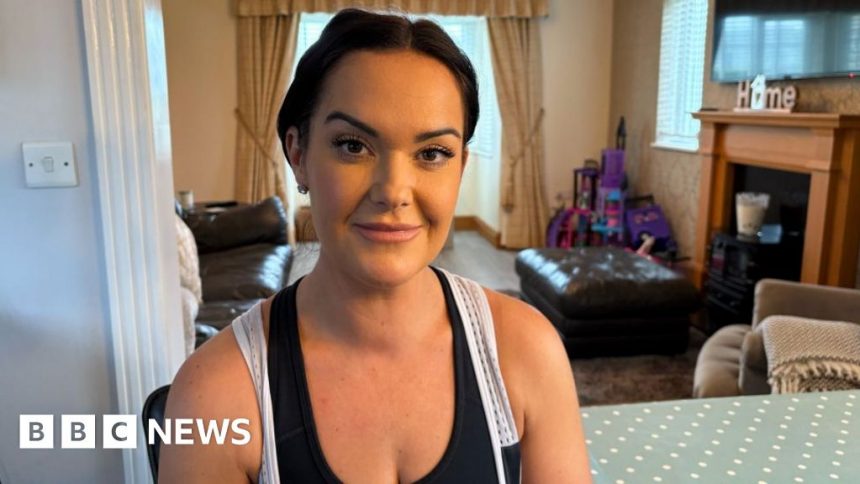‘I discovered my fat build-up condition after a Love Islander had it’
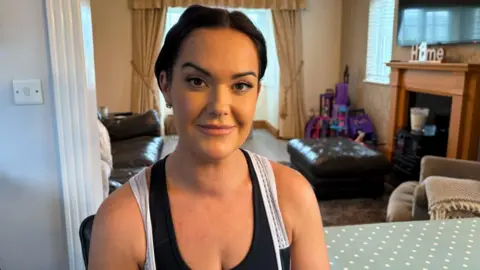 BBC
BBCFor years, Emma Griffiths was self-conscious about the fact her legs had grown out of proportion with the rest of her body.
But it wasn’t until she was watching Love Island one night that the nurse noticed contestant Shaughna Phillips had the same shape legs – and started doing some research.
Experts online suggested Shaughna had lipoedema and amateur triathlete Emma then knew “this is what I had, I’m not just obese”.
The 35-year-old mother has now joined calls for more support to be available on the NHS for people with lipoedema.
Lipoedema causes fat to abnormally build-up mainly in the hips, buttocks and legs, leading to a disproportionate shape.
The exact cause of the chronic condition is unknown but it is not from being overweight.
Lipoedema may be caused by changes in hormones and is believed to affect about one in 10 people worldwide – although many do not know they have it.
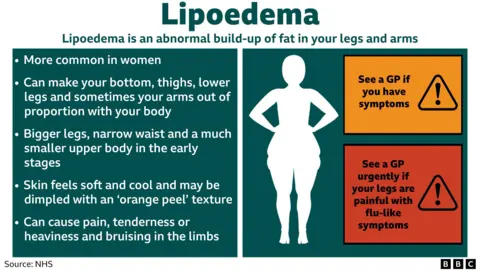
Emma was about 11 when her legs started to feel heavy and throb and said they started to grow bigger.
“I was looking in the mirror and thinking ‘there’s something wrong here, why are my legs different to girls my age?’,” she recalled.
Despite leading a healthy lifestyle and at one point losing five stone, Emma’s bottom half remained bigger and she suspected something was wrong.
“I thought this is not responding to diet and exercise – something is going on here,” said the mum-of-two from Ammanford in Carmarthenshire.
“If I hadn’t had seen Shaughna Phillips on Love Island, I don’t think I would have known that I had lipoedema… or at that point, had the diagnosis.
“I went to see the GP and he didn’t know what I was talking about.”
Despite having some NHS support, Emma asked to be referred to a lymphoedema clinic and a private surgeon diagnosed her with stage two lipoedema in 2022.
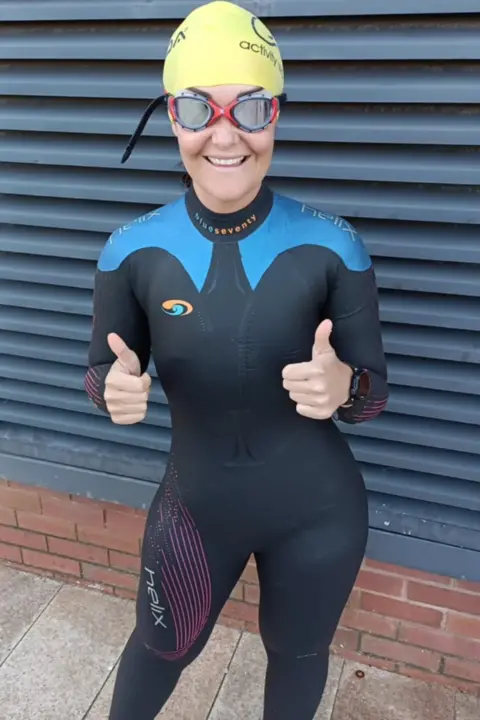 Emma Griffiths
Emma GriffithsLiposuction surgery removed four litres of fat from her thighs and while Emma said it helped, she said it did not cure her condition.
She now manages it through a healthy lifestyle, wearing compression stockings and dry brushing her skin. She says that helps with swelling and pain relief.
‘My legs weighed about 11 stone before surgery’
Gemma Robinson has also struggled with lipoedema and before her surgery, her legs were estimated to weigh about 11 stone (70kg).
The 45-year-old has spent almost £70k on eight surgeries over two years to have 86 litres of fat and excess skin removed.
“Every time I was going back to the clinic my legs were growing,” said the mother-of-two from Cardiff.
Gemma said at one point she was almost housebound and could only get around through the help of a pushchair or shopping trolley.
Despite losing nine and a half stone, she said it was mainly from her top half.
“My mobility was decreasing and I was going to end up in a wheelchair with my children pushing me,” she said.
Gemma spent years going back and forth to her GP where she claims her symptoms were “brushed off” and put down to obesity, until she saw something on TV and asked for a referral.
“A doctor said to me ‘if I gave you a lettuce leaf for every meal for the rest of your life, you would still not lose much more weight’,” she recalled.
Gemma was diagnosed with stage four lipoedema and secondary lymphoedema.
She said surgery was “life-changing” but the psychological impact was “horrific” and now has body dysmorphia and scarring.
“Living with lipoedema is very hard,” said Gemma. “If I was diagnosed earlier, I wouldn’t have lived my whole life thinking I was just obese, that it was all my fault.”
Gemma claimed she was offered compression therapy on the NHS and believed support for women with lipoedema is lacking.
‘Women are put on the scrapheap’
The National Institute for Health and Care Excellence (NICE) – which advises what medication and treatments should be available on the NHS – has said the use of liposuction for chronic lipoedema was not recommended, except for research.
They said there was not enough evidence on how safe and effective it was. Current treatments include lifestyle changes and compression.
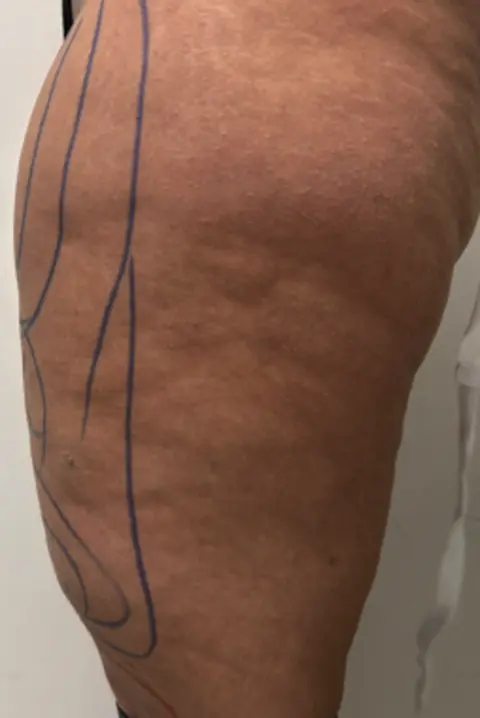 Emma Griffiths
Emma GriffithsThe BBC has spoken to 15 women across England and Wales with lipoedema and many said influencers and their own research led to their diagnosis.
Some claimed GPs dismissed symptoms as a “severe bout of cellulite”, “growing pains”, obesity and arthritis.
One teenager said she was prepared to use her inheritance to fund liposuction, while another woman said she was using her pension funds and was willing to sell their house to fund her daughter’s surgery.
Two women said they developed eating disorders – and two more said they felt suicidal.
Over the course of eight months in 2024, an NHS body set up in Wales to raise of awareness of the condition saw 8,485 women – and more than 5% (459) were diagnosed with lipoedema, a freedom of information request by the BBC revealed.
That number is the “tip of the iceberg” according to a specialist lipoedema charity that was calling for more specialists that can diagnose the condition.
“It’s absolutely infuriating that a treatable condition like this is ignored and that women are put on the scrap heap,” said Lipoedema UK’s head of research Dr Lesley Steinitz.
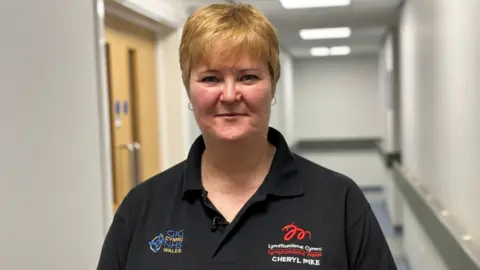
Lymphoedema specialist Dr Cheryl Pike also wants to increase awareness among GPs.
“If somebody could believe their patient and know that any health care professional can refer, it will make a big difference,” said Dr Pike of Lymphoedema Wales Clinical Network.
The network run by the seven health boards in Wales has started the first psychological support service of its kind in the UK.
They want the Welsh government to help fund research to discover the effectiveness of liposuction for those with lipoedema.
The Welsh government said it worked closely with the NHS’ lymphoedema network to raise awareness of lipoedema.
“Liposuction is not routinely available for lipoedema patients, unless under certain circumstances, and surgery is being offered for those with the greatest need,” added a government spokesperson.
NHS England has been asked to comment.



